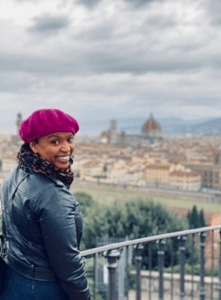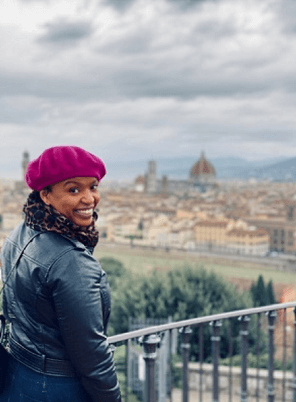An Interview with Caroline McCoy, Program Officer, Robert R. McCormick Foundation
Caroline McCoy, Program Officer, Robert R. McCormick Foundation
Advocate. Driven. Passionate.
LinkedIn
Tell me about your current role?
I’m a program officer at the Robert R. McCormick Foundation based in Chicago, Illinois. I’m part of the Communities program and our work spans across jobs, economic opportunity, health and wellness, and education. We look to invest in work that’s supporting Chicagoans with the most disparate outcomes. I have the opportunity of supporting a place-based initiative in Englewood, a predominately Black neighborhood in Chicago, where intentional disinvestments have impacted the community. The community galvanized around a quality of life plan organized by Local Initiatives Support Corporation (LISC). Residents wanted to see change and worked across several issue areas to create strategies to address that change. Owning the narrative surrounding their community and being seen as assets is important for residents. In my role, I elevate this and center community voice in supporting resident driven solutions. I think about racial equity in my work. It’s necessary to understand the history, the stakeholders, players, and the dynamics that are a part of a community.
I’m also point for our health and wellness portfolio which includes supporting work that’s providing access to primary and preventative care to ensure Chicagoans with the most disparate outcomes are getting care. For example, we know that Black women have higher instances of maternal health issues. We want to ensure that Black and Brown populations have access to mental health services. And we care about how undocumented individuals are able to access care. We also support initiatives that are diversifying the healthcare workforce and creating more opportunities for culturally competent care. We also support work that’s expanding access to healthy foods and providing safe space for active living.
If there was a soundtrack of greatest hits related to your career, what would make the list?
I think in this moment in time and thinking about work I’m doing in philanthropy, I would say “Alright” by Kendrick Lamar would definitely be on the playlist. It’s a reminder of the struggle and a reminder to keep on fighting.
Work in the social sector can be very personal and tied to one’s values. Can you think of a time when your values were in tension and how you reconciled that tension or not?
For me I have always been committed to being – in education and my professional career – in spaces where representation matters and my voice as a Black person matters. A few jobs ago while working in a nonprofit, a decision was made that would negatively impact some of the families we served. I was at a crossroads. I knew I could speak up and that could cause repercussions, yet I had an obligation and opportunity to advocate for families, so they weren’t disrupted by the decision to be made. I spoke up and ultimately, I was taken off the project, but the organization decided to do something different which didn’t impact families as negatively. It was a pivotal moment for me in understanding the importance of my voice especially in spaces where representation really matters. It’s made me very clear about my purpose and being intentional about how I’m operating in these spaces on behalf of those I’m advocating for. 
Can you share an experience in the workplace where you have had to reclaim your time? What was the context? How did you navigate it?
I’ve learned working in spaces that can be challenging as a person of color, that I’ve had to set boundaries so I can engage in work in a way that’s authentic for me. I appreciate that I’ve had space to do that in my current role. I’ve worked out a schedule that allows me to spend more time on the ground in the community so I can forge deeper relationships to be able to advocate for what the community needs. I understand that not everyone has this opportunity, so I own my privilege, but it’s helped me focus more deeply on the work in a real way outside of the walls of the office. (Caroline pictured at right living her best life in Florence)
What’s your approach to self-care? Are there any rituals you use to survive and thrive?
In 2018 I became really intentional about asking other women of color what they are doing for self-care because I saw how many of my friends and colleagues were so busy taking care of others, sometimes at the expense of not taking care of themselves. And I saw that in myself as well. I became really focused on prioritizing my own health and wellness, which for me means a dedicated gym schedule and shifting my relationship with food.
Another big self-care piece is travel. I take small trips here and there. But in the past few years, I’ve focused on bigger international trips. Last year in December I spent time in Kenya with my family. I was born there but moved to the US as a toddler and hadn’t been back to visit as an adult. It was the best trip – being in the motherland was very centering and being surrounded by people who look like me was so powerful. Both sets of my family own land and I had the opportunity to spend time in both places. I had this interesting moment when I complained about a stomachache and my uncle gave me some herbs growing on the land to settle it. He then went on to point out all the herbs and plants that had healing properties for various ailments. Mother Africa gives you everything you need – literally! I felt so connected to the land, my people, and the experience that I’m at a point in my life where I’m trying to figure out how I can get back there more regularly and figure out a way to live there for parts of the year.
We come from a resilient and strong lineage. How would you describe the type of ancestor you want to be and why?
I definitely think about some of the ancestors and women who have come before me in my family…the resilience, fearlessness, and hard work that they have done for others, and how they inspire me to fiercely advocate for the people and communities I care so deeply about. I also think about the ways I’m investing in the lives of others and truly loving and caring for people from a real place.
What advice would you offer other Black women trying to develop or amplify their voice and become self-advocates?
One thing I have been reflecting on is the journey of understanding how to be an advocate for yourself and understanding your own value. I had an executive coach who made me do an exercise which I thought was stupid initially. She asked me to put together a PechaKucha with a series of twenty slides that reflected each value that I bring to my work and I had seven seconds to explain each one. The exercise was helpful because it helped me understand and articulate my value and how to quantify it.
I’ve been grateful for the guidance and support of other Black women. In Chicago, I feel especially grateful for other Black women working in philanthropy. They’ve helped me in so many ways including helping me step into my power. They’ve been a constant source of support and strength. Finding and cultivating a network like this is really important.
If you could change the social sector in a way that would benefit, lift up, or affirm Black women, what would that change be?
Be honest and able to talk about things that have happened to Black people and have those difficult conversations. And in that also be open to learning about the issues that impact Black women and how their experiences may differ from others. I’ve personally experienced the pressure of being asked to assimilate and have had my comments or actions stereotyped. It’s important that we create space for Black women to bring their authentic selves to these spaces. We also need to address the wage disparities that impact Black women and create supportive pipelines for Black women in leadership.



Comment section